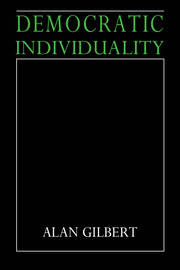Book contents
- Frontmatter
- Contents
- Preface
- Introduction
- Part I THE THEORY OF POLITICAL FREEDOM AND INDIVIDUALITY: SLAVERY, MUTUAL REGARD, AND MODERN EGALITARIANISM
- PART II DEMOCRACY AND INDIVIDUALITY IN MODERN SOCIAL THEORY
- 5 Historical materialism and justice
- 6 Two kinds of historical progress
- 7 The Aristotelian lineage of Marx's eudaemonism
- 8 Radical democracy and individuality
- 9 The Protestant Ethic and Marxian theory
- 10 Nationalism and the dangers of predatory “liberalism”
- 11 Democracy and status
- 12 Bureaucracy, socialism, and a common good
- 13 Levels of ethical disagreement and the controversy between neo-Kantianism and realism
- Conclusion: the project of democratic individuality
- Bibliography
- Index
13 - Levels of ethical disagreement and the controversy between neo-Kantianism and realism
Published online by Cambridge University Press: 05 June 2012
- Frontmatter
- Contents
- Preface
- Introduction
- Part I THE THEORY OF POLITICAL FREEDOM AND INDIVIDUALITY: SLAVERY, MUTUAL REGARD, AND MODERN EGALITARIANISM
- PART II DEMOCRACY AND INDIVIDUALITY IN MODERN SOCIAL THEORY
- 5 Historical materialism and justice
- 6 Two kinds of historical progress
- 7 The Aristotelian lineage of Marx's eudaemonism
- 8 Radical democracy and individuality
- 9 The Protestant Ethic and Marxian theory
- 10 Nationalism and the dangers of predatory “liberalism”
- 11 Democracy and status
- 12 Bureaucracy, socialism, and a common good
- 13 Levels of ethical disagreement and the controversy between neo-Kantianism and realism
- Conclusion: the project of democratic individuality
- Bibliography
- Index
Summary
The foregoing account of objectivity has marked an intricate interplay between core moral standards, social theoretical disputes, complex ethical judgments, overall moral theories, and metaethics. As they became relevant, I have pointed to these five levels; more conceptual apparatus was not needed. But the interplay of these levels is complex and has itself generated metaethical confusion.
This chapter will show that the conflict between neo-Kantians and realists does not pivot on just one level – say, controversies over the role of empirical disagreements in broader moral disputes – but that each metaethical view selects different subsections within the structure of moral argument for emphasis. Broadly speaking, for Weber, starting points in disparate realms of life determine clashes of fact and social theory, and more complex ethical assessment; thus, quite high level judgments about moral epistemology and vocational standpoint shape the argument all the way down. He occasionally noticed core standards – those involved in claims about “being a scoundrel” yet in his reflection on the structure of broader ethical clashes, these criteria vanish. For the realist, moving in the opposite direction, underlying ethical standards and discoveries determine what it is for an argument to be moral at all. These standards provide broad parameters for evaluating conflicting moral theories; they justify some important inferences in moral epistemology.
- Type
- Chapter
- Information
- Democratic Individuality , pp. 451 - 466Publisher: Cambridge University PressPrint publication year: 1990



